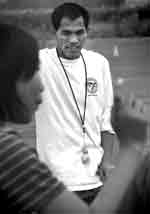The Fresno way of life
With the new wave of Hmong refugees settling into Fresno, students lend
a hand to help make Fresno home
| 
Senior Mai Lor works at the Academy for New Americans each week
and mentors the new Hmong children. Lor said the Hmong children
used to play soccer at Wat Tham Krabok camp. Photo by
Cole Davis |
By EMILY TUCK
As the new group of Hmong refugees becomes more familiar with life in
Fresno, both students and on-campus organizations have opened their hearts
and dedicated themselves to help make the transition a warmer one.
For some Hmong students, this issue resonates even closer to home.
Hmong Student Association president Sandy Cha said some of the club members
tutor children at various elementary schools to improve their English
language skills and prepare them for grade school.
The club currently works with Stone Soup, a local organization that works
closely with helping and welcoming the newcomers.
Two years ago, the club contacted Stone Soup to help their cause. Now,
Cha said, they are realizing this goal.
One club member, Mai Lor, works with at-risk youth at the Academy for
New Americans. He teaches after-school physical education classes, where
children currently play soccer.
Lor said he, too, was once a refugee. But he said he had a little more
education and preparation than the newest influx of Hmong.
He came to Fresno in the summer of 1993, when programs like these weren’t
available, he said.
“Most kids like [the sports],” Lor said. “About 90 percent
of them already know soccer. They’re good athletes.”
Lor said the hardest part is the language barrier and the family’s
low income. For most, unlike Lor when he first arrived, this is the children’s
first exposure to English.
“I’m just trying to give back what I learned,” Lor said.
In addition to tutoring and mentoring children, Lor said he also participates
in monthly parties designed to welcome the new Hmong people into the community.
“It’s great that they’re here,” Lor said.
The Hmong Student Association isn’t the only on-campus group working
to help the Hmong community.
In October, the student-based organization Campus Lutheran Ministries
held a winter clothing collection drive to benefit Hmong refugees, bedding
and basic necessities for new families coming to Fresno.
Senior art major Renee Carvalho, who said the project started in August,
contacted churches around Fresno to set up bins for distribution and clothing
collections.
“I made church speeches and put announcements in church bulletins
to get the word out about the need for the newcomers,” Carvalho
said.
The project began when the church found out that few local organizations
concentrated on collecting bedding and winter clothes. Students and volunteers
from other colleges also pitched in to collect and distribute the donated
items.
Lutheran Campus Ministries intern Bill Dahl said the project has had a
great response.
“We’ve collected over 350 big garbage bags (of donations),”
Dahl said. “It’s enough to provide bedding for a couple of
hundred families…maybe more.”
The donations collected more than 35 garbage bags full of men’s
clothing, 36 bags of women’s clothing, 45 bags of children’s
clothing, 97 bags of household and miscellaneous items, and more than
50 bags of beddings, such as pillows, blankets and sleeping bags.
In April, Cha was nominated on behalf of the Hmong Student Association
to spend a week at the Hmong refugee camp called Wat Tham Krabok, located
in the mountains of southern Thailand.
Cha worked on the health committee, screening children for dental problems
and adults for illnesses.
She worked to prepare the community for the newcomers and made contacts
with local agencies so that refugees would have a place to go when they
arrived.
Cha described the children at the camp as “bright and so intelligent”
and said she enjoyed the interaction.
“They were really eager to come [to the United States],” Cha
said.
However, Cha said many of the adults had serious health problems. “Some
had [tuberculosis],” she said. “A lot had respiratory problems.”
Since many of the Hmong have to work in the mountains mining granite,
the respiratory problems, Cha said, most likely came from the dust that
settled from mining.
“You can hear them blowing up the granite,” Cha said. “You
can see the dust.”
Cha said she worked with a Thai doctor who gave out medicine, which the
refugees welcomed.
“[The medicine] was what people were looking for,” Cha said.
And much like the children, the adults and parents looked forward to the
opportunity of relocating—but they had a lot of worries about coming
to the U.S., she said.
Although Cha was born in California, the experience at the camp was still
a personal one.
In fact, it was at the camp that Cha met her grandparents from her mother’s
side for the first time.
“It was interesting and draining, seeing how people were living,”
Cha said. “It was sad to see where my parents came from.”
Cha said her parents and their families came to the United States in the
late 70s, during the first influx of refugees. Her parents later met in
the United States. She said although her family experienced struggles
and prejudice, they know now that things are different for their children.
But with all the celebration at hand, Cha and other students are keeping
the big picture in mind.
And now that the other families are arriving in Fresno, Cha said she’s
excited, especially considering one of her aunts will be moving out of
the camp to live with family in Minnesota.
“All of this resettling is about reuniting the families,”
Cha said.
|

